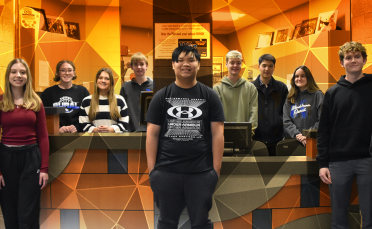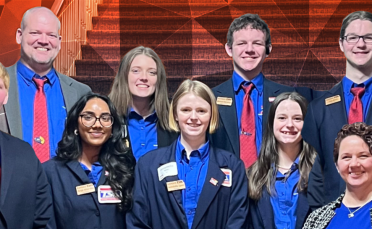The Missing Chapter: Career Exploration Before High School

When first becoming parents, most of us spend time learning from parenting books, blogs and one another about what we are supposed to do with these squirming, stubborn, tiny humans. Whether we’re learning to recognize developmental milestones or how to handle meltdowns, many of us depend on these resources to guide us through the journey of parenthood. This is especially true with our first child (not so much for each child thereafter!).
But as we learn to trust our instincts and the kids enter the school years, most of us lose track of these touchstones and just go with the flow. We draw upon our own experiences learning these skills from our own families, or we model our own behaviors after how our friends and family members handle different situations with their own kids.
But when it comes to helping our children prepare for entering the workforce, a lot has changed in recent years. There are so many ways to gain career and skill training now, and all of them are equally valid and beneficial paths: on-the-job training programs, apprenticeships, private training programs, technical or community colleges, and colleges and universities. Those who don’t take the time to assess all of their options will blindly guide their children to only what’s familiar, likely missing many other viable possibilities.
The HirePaths philosophy is that parents must intentionally take on the challenge of helping their kids explore careers starting early in life — after all, as their parent or caregiver, YOU are your child’s first career counselor. The more you can help them get excited and comfortable exploring their options at a young age, the more confident they’ll be when the time comes to make choices about their future.
But do not fear — until authors start including chapters on career exploration in their parenting books, HirePaths can help! Here are ideas for activities you can do with your child at every age.
Early Childhood (Birth to Preschool)
The important first few years of life are about brain development and basic skill attainment. These are the years we start to communicate with others as we learn about the world around us. As parents, some of the most important skills we can instill in young children that will later pay off for them on the job include:
- Curiosity;
- Kindness, empathy and good manners;
- Basic literacy and life skills (cutting, coloring, sorting, stacking and identifying letters, numbers, sounds, colors and symbols);
- Creativity and problem solving; and
- A love of learning.
What do these simplest and most foundational skills have to do with careers? Everything! Think about the people you work with. Which of your co-workers:
- Communicates well?
- Thinks creatively and comes up with solutions to problems?
- Treats their colleagues appropriately and with respect and kindness?
- Is always eager to jump in, work hard and help others?
These employability (or soft) skills all begin developing in children long before they set foot in a classroom. After all, parents are our first teachers!
Another thing you can do is make sure your child sees you working — both for employment and as part of home life. Allow them to play alongside you and help, even if the “work” only lasts a few minutes. If they see you have a good work ethic and attitude, it will go a long way to shaping their own attitudes toward getting a job done. Likewise, reward them with praise or special perks when they’ve gone above and beyond to reinforce their efforts.
For some concrete suggestions on activities you can do with your kids in early childhood to begin developing career exploration skills, I’d encourage you check out Five Ways Parents Can Encourage Career Exploration in Early Childhood.
Early Elementary (K-3 grades)
Early elementary is a great time to use dramatic play, media and other types of hands-on adventures to try out various skills related to careers. Whether that’s setting up a restaurant, store, office or shop and “playing” different careers at home, reading books or watching movies together, or taking a field trip to a library, museum, discovery center, park or zoo, there are lots of ways children in this age group can use their five senses to learn about the world of work. By intentionally having conversations to inspire them to think about work and jobs, you can sneak introductory career exploration activities into everyday life.
Also, talking about what you and other adults do at work is a great way to pique kids’ curiosity. It’s amazing how many kids have no clue what their parents do for a living, simply because parents don’t take the time to explain it to them! By the time our kids are in early elementary grades, most should be able to understand a simplified explanation of what the adults in their lives do — who their customers or clients are, what type of environment they work in, how their work makes money, how they learned the skills to do that work and so forth.
Learning about careers through books, recordings and movies is a great way to also practice early literacy skills. Whether through fiction or nonfiction, or read by the adult or by the child themselves, media can provide entertaining ways to expose kids to various types of jobs.
Regardless of how you’ve exposed your child to a career, it’s a great habit to spend a few minutes afterwards talking about what they’ve experienced so they think more deeply. Ask them questions about what they’ve witnessed, such as:
- Which job in the book seemed the most fun to you? Why?
- In the story, what did we learn about where George’s mom goes to work? Who do you think she helps in her job? How did you figure that out?
- In the movie, what kinds of workers did the kids pass when they were walking down the street? What were they doing?
- At the zoo, did you see any people working? What kind of work did they do? What looked fun? What do you think you’d enjoy?
In the Explore Careers pages on the HirePaths website, we’ve provided activities parents can do in Kansas to explore various industries. Click on each of the twelve industry categories for a list of ideas for this age group and older. Here’s an example.
Check out this blog for some great book titles you might want to suggest for early readers: Exploring Careers Through Summer Reading: Suggestions for Early Childhood, Ages 3-9.
Intermediate Years (4-8 grades)
In upper elementary and middle school, educators are being encouraged to work career exploration more regularly into the classroom. Likewise, these are key years for parents to encourage active research about different possibilities. Some kids will begin self-study at this age and start acquiring skills on their own — YouTube, books and basic career and technical education (CTE) courses often can be a launchpad for kids to start tinkering.
These are great years for kids to start working around the house or taking small jobs from friends or family members as a way to earn money. Whether that’s helping with yard or housework, babysitting, watering plants, walking dogs or picking up mail while a neighbor is on vacation, there are great opportunities to learn to be responsible to an employer and follow the directions of others.
In middle school, your child will probably start hearing the term IPS — Individual Plan of Study. Thinking ahead about what types of skills courses they want to try out through electives in middle and high school will help them make sure they have enough time to work those courses — and any prerequisites or advanced courses — into their schedules.
Here are several activities you can explore together with your middle-grade children — or you can encourage them to do independent research about their future possibilities!
- Watch our Cool Careers videos as a family, and then follow up with a conversation about different types of jobs they’d like to learn more about and try themselves.
- Organize job shadow experiences for your kid to see firsthand what different jobs are like. Tap into friends, your kids’ friends’ parents and your family members for possible careers they could observe. Consider swapping kids with another parent — you take their kid to work and they take yours! Make sure you talk about what they witnessed afterwards.
- Together, set aside time to take career quizzes and personality assessments, and then look for online content about the fields the software recommends.
- Encourage your child to get a paying job from someone other than you — a neighbor, friend or family member would be great — to learn important soft skills such as showing up on time, doing the work assigned with a good attitude and meeting deadlines.
- When you are out and about as a family, make conversation with people in different jobs and ask them why they like their job or how they learned their skills so your child can hear the answers firsthand — and maybe ask their own follow-up questions.
- Suggest to your child they take a CTE course in middle school such as a business, technology, cooking or shop course. This is a great way to get a taste for what these types of courses will be like in high school.
- Encourage your child to try a volunteer experience in your community — such as at your public library, hospital or a retirement community — to see what it’s like to have a job, conform to a schedule, follow instructions and learn from adults who aren’t their parents or teachers.
- Challenge your child to participate in local STEM clubs, activities, and courses in the summers, at school or during their free time. These are great way to get a taste of real science, technology, engineering and math-based careers.
- Look for online activities your child can do to try out STEM skills at home. There a lot of online resources with age-appropriate ideas. Here's one geared toward middle school students.
- It’s important at this age to keep encouraging your child to read. Here are some great books that will help middle readers explore careers and practice their comprehension skills.
With pre-teens and adolescents, it’s important to look for cues if your child wants you to be a big part of their exploration process, or if they want to do their research independently and share with you what they find. Either option is ok! Their interest in you being a part of their journey will come and go as they mature and grow more comfortable with the research process. Take cues from them and learn how they respond best to your suggestions.
Choosing a career is a big choice and can have huge financial repercussions — but it is not a decision set in stone. Most people change careers multiple times in their lifetimes. The best way to start the journey is for your child to know you’ll always be there to support them regardless of which path they choose first.
Want to jumpstart career exploration in your house this summer? Check out 100+ Ideas You Can Do at Home to Explore Careers with Your Kids!




